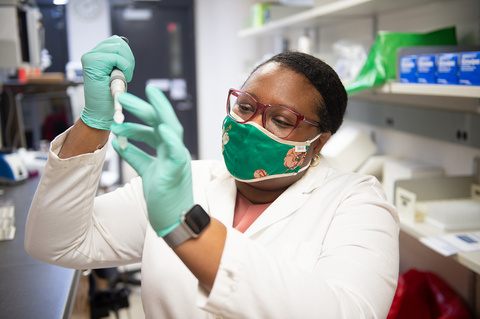
How does the immune system function? When and how does the body respond to infections and diseases?
“If we can understand how our natural immunity develops, we can develop therapies to improve those responses,” says Angela Pack, PhD, post-doctoral research fellow in the Department of Microbiology and Immunology. “Sometimes, we can even reverse dangerous immune programming that occurs naturally.”
Pack is passionate about finding answers to immunology questions.
“I love studying the molecular warfare between pathogens and each host’s immune system,” she says.
The importance of mentors in science
Pack found her first true science mentor during an internship at Oak Ridge National Laboratory.
“Hugh O'Neill, PhD, showed me that I could dream and could learn about anything,” she says. “He really made me feel very empowered. Working with him showed me that lab research is one of the few jobs where your imagination is a true gift.”
For younger students considering a career in science, Pack knows exactly what she’d tell them.
“Focus on getting great mentors first, rather than specific research,” says Pack. “A great mentor can change the entire trajectory of your career. He or she will guide you and help you grow into a great scientist.”
A diversity of voices
Pack was a freshman in high school when she realized she wanted to become a scientist.
“There weren't a lot of scientists like me,” she says. “In fact, I only had one Black professor or teacher the entire time I received my education, from kindergarten through graduate school.”
Recently, she was named as one of the 1,000 inspiring Black scientists in America.
“I was very excited and honored to be featured with such a great group of scientists,” she says. “We must all be champions of change by using our voices and getting people into places of power and privilege, where people like me were never intended to be.”